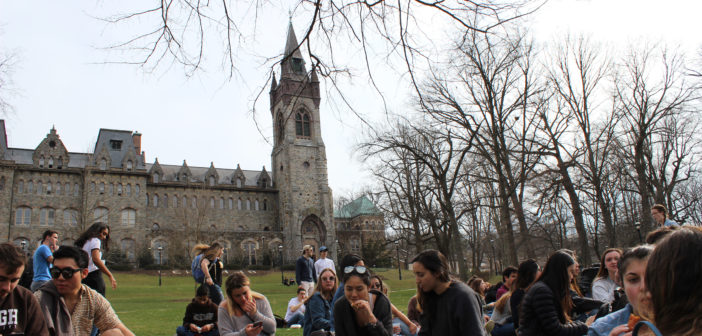Lehigh’s Greek councils are working to create a more prominent sense of community after three chapters lost university recognition within the last year.
Kappa Sigma lost university recognition in July 2017, Sigma Chi in November 2017 and, most recently, Alpha Chi Omega in March.
“Instead of being backward-looking…we said, ‘What are we doing as a community to, you know, hold each other accountable, to be transparent, to make sure that we’re creating a really positive environment?’” said Ian Davis, ’18, the president of the Interfraternity Council.
Molly Bankuti, ’18, the president of the Panhellenic Council, said the loss of chapters has caused members of the Greek community to take a hard look at their own organizations and made them more willing to talk about the challenges they face.
When Sigma Chi was dissolved, two chapter members had to vacate their executive positions on IFC. Although the board was forced to make a big transition in a short period of time, Davis said the changes didn’t impact IFC’s original objectives.
Davis said IFC members have focused on reevaluating their judicial process, enacting a hard alcohol ban earlier this semester and improving communication.
Panhel has taken a similar approach after the loss of AXO, which was the first sorority chapter to lose university recognition on Lehigh’s campus since Delta Gamma in 2013.
Bankuti said the executive council has emphasized tradition while determining areas for growth and is trying to battle apathy within the social climate by involving general members in conversation and decision-making.
IFC has also joined in on the conversation. Davis said executive members have attended different organizations’ chapter meetings to maintain transparency and pass along information from different administrators on campus.
“Having conversations with people that aren’t just the (chapter) presidents — it makes it much easier to convey what you’re doing, and I think you can get a little bit more buy-in that way, too,” he said.
The councils also worked together to host a campus-wide event.
Inspired by University Production’s Spring Fest and Delta Chi’s “Chi Chella,” the councils turned Greek Week into a Greek Unity Concert. The concert was held on the UC Front Lawn on April 13.
“We want to strengthen ties and relations with students not involved in Greek life,” said Erin Garrity, ’18, the vice president of Greek relations for Panhel.
Creating a sense of community between affiliated and non-affiliated students has always been a challenge for the councils. However, it has taken on a new meaning with members of dissolved organizations still on campus.
Bankuti said although the members of AXO made mistakes that warranted the dissolution, they did make positive contributions to the community for a long time.
“First and foremost, these people are our friends, and even if they’re no longer recognized as members of our community, they’re still part of the Lehigh community,” she said. “It’s something that we’ve been trying to really promote — to make sure that they are not feeling alienated and they are not becoming really cut off from the rest of us.”
Bankuti said Panhel has tried to motivate women to make personal connections and have conversations with former members.
Other Lehigh students have noticed these efforts.
“I think IFC, Panhel and the (Cultural Greek Council) are all taking really important steps to improve unity in Greek culture, which is really important to Lehigh,” Danielle Okun, ’21, said.
Unity can only remain a priority, however, if students continue to work toward positive changes.
“As we see chapters that are dissolved, it’s a reminder to the chapters that still exist that there is a standard we expect,” Bankuti said. “If they don’t meet the standard the university sets, they won’t be recognized anymore.”






Comment policy
Comments posted to The Brown and White website are reviewed by a moderator before being approved. Incendiary speech or harassing language, including comments targeted at individuals, may be deemed unacceptable and not published. Spam and other soliciting will also be declined.
The Brown and White also reserves the right to not publish entirely anonymous comments.
1 Comment
Maybe “unity” isn’t what’s needed so much as diagnosis. Why are you guys, as a group, behaving terribly so routinely? Most groups don’t do this. But you do, and you’ve done it as far back in time as I can see. Maybe you need to be answering questions like:
Is there something about secret societies that attracts people who are likely to be socially destructive or fearful of speaking out?
Is there a reason why, when we see our friends doing things that your average sane person would respond to with “oh my god, what are you doing”, we instead agree that it’s awesome or go conveniently blind to it?
Are we people who feel a real need for group affiliation and feel not so good if they’re not solidly in a group and assured constantly of belonging?
If so, does that scare us out out of refusing to go along with or speaking out publicly against people in our group behaving terribly?
To what extent are initiation rituals designed to bind us by making us feel complicit in things we feel are taboo or are actually illegal?
What does it say about us that our amazing bond of siblinghood rests on our parents’ ability to pay fat social dues?
If we saw something unethical or criminal going on in our house, would we be more inclined to hide it from public view or expose it?
Do we feel we are entitled to get away with unethical or criminal things under the banner of “fun at college” or “the house”?
How do we as individuals become strong enough that we can look at any or all of what’s going on in our house, decline to participate, and talk openly to people in positions of authority or even in the press about it without feeling defensive or fearful?
I mean it seems to me that an unhealthy unity combined with entitlement is at the root of most of the problems.